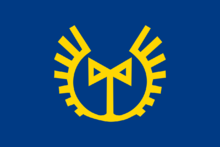imported>Applethesky2021 No edit summary |
imported>Applethesky2021 No edit summary |
||
| Line 30: | Line 30: | ||
[[File:Scientocracy Small.png]] [[Scientocracy]]<br> | [[File:Scientocracy Small.png]] [[Scientocracy]]<br> | ||
[[File: Technocracy.png]] [[Technocracy]]<br> | [[File: Technocracy.png]] [[Technocracy]]<br> | ||
[[File:Legalism.png]] [[ | [[File:Legalism.png]] [[Autocracy|Legalism]] ([[File:Mohism.png]] Mohism) | ||
|likes = Achievement | |likes = Achievement | ||
|dislikes = Nepotism | |dislikes = Nepotism | ||
Revision as of 22:32, 15 June 2022
Meritocracy, or simply Merit, is an ideology based on the talent and effort on individuals instead of the individual's wealth and placement in the social class. The way of advancing in this system is by performance and achievement.
How to Draw

- Draw a ball.
- Fill in with navy blue.
- Draw the meritocracy symbol in yellow.
- Draw in the eyes.
- Optional: Draw in the lorgnette.
You're done!
| Color Name | HEX | RGB | |
|---|---|---|---|
| Navy Blue | #003785 | 0, 55, 133 | |
| Yellow | #FED700 | 254, 215, 0 | |
History
In Asia 
Meritocracy was first used in China in the 6th century BCE when it was supported by Confucius. The Qin and Han dynasties used this system for power over their empires, it helped them keep their complex system of Chinese officials.
In the 13th century, the Mongol Empire was reliant on Meritocracy, where soldiers promote to a higher rank based on their merits. After the collapse of the Mongol Empire,![]() Aristocracy, later replaced the current systems in the Yuan Dynasty and Ilkhanate. The other remainder Mongol states Golden Horde and Chagatai Khanate kept this system.
Aristocracy, later replaced the current systems in the Yuan Dynasty and Ilkhanate. The other remainder Mongol states Golden Horde and Chagatai Khanate kept this system.
The Timurids used this system. Meritocracy over time would disappear in the steppes region. The Ming dynasty reused the Meritocracy system in military and administration.
In the 17th century, meritocracy spread outside of Asia into Europe and the United States. Great Britain implemented Meritocracy in British India as a civil service, making it the first European power to do so. Employees are promoted by their managers based on competitive examination in an attempt to avoid corruption and favoritism.
 In the UK
In the UK
Around 1847 Thomas Taylor Meadows made his Desultory Notes on the Government and People of China. Near the 19th Century, it had caught on and the "Chinese Mandarin System" was adopted.
John Stuart Mill also had a meritocratic idea when he wrote in Considerations on Representative Government, that some more educated voters ![]() should have been given more votes.
should have been given more votes.
The term Meritocracy was coined by Michael Young in 1958 in the novel The Rise of the Meritocracy.
Relations
Friends
 Technocracy - Surely, someone sharing our rule of the merited, specifically technical experts and scientists.
Technocracy - Surely, someone sharing our rule of the merited, specifically technical experts and scientists. Chinese Theocracy - Confucius is one of my early inspirations but this emperor stuff is weird.
Chinese Theocracy - Confucius is one of my early inspirations but this emperor stuff is weird. Noocracy - Also someone sharing our rule of the merited, specifically the all-knowing.
Noocracy - Also someone sharing our rule of the merited, specifically the all-knowing. Cyberocracy - Well, if an AI is skilled enough...
Cyberocracy - Well, if an AI is skilled enough...
Frenemies
 Democracy - Better than its predecessors, but as a great man once said, "the people are retarded".
Democracy - Better than its predecessors, but as a great man once said, "the people are retarded". Welfarism - I can appreciate the need to work towards the common good, but how do we know if were giving welfare to the deserving?
Welfarism - I can appreciate the need to work towards the common good, but how do we know if were giving welfare to the deserving?
Enemies
 Kakistocracy - An opponent averse to our ideas of the merited.
Kakistocracy - An opponent averse to our ideas of the merited. Ceremonial Monarchism - You're an insult to the institution of monarchy.
Ceremonial Monarchism - You're an insult to the institution of monarchy. Social Liberalism - You can’t just solve all your problems by throwing money at them.
Social Liberalism - You can’t just solve all your problems by throwing money at them. Combatocracy - Wtf, no.
Combatocracy - Wtf, no. Caste System - People should have their worthy decided by merit, not by a "caste" they were born into.
Caste System - People should have their worthy decided by merit, not by a "caste" they were born into.
